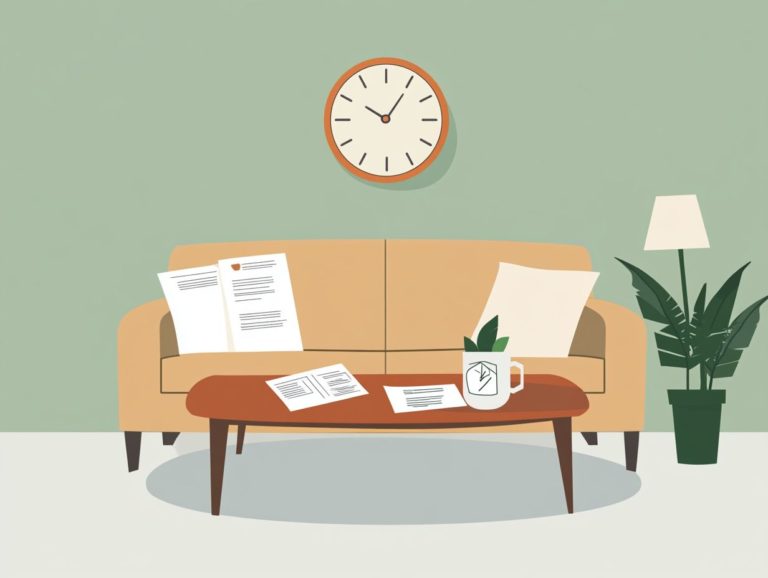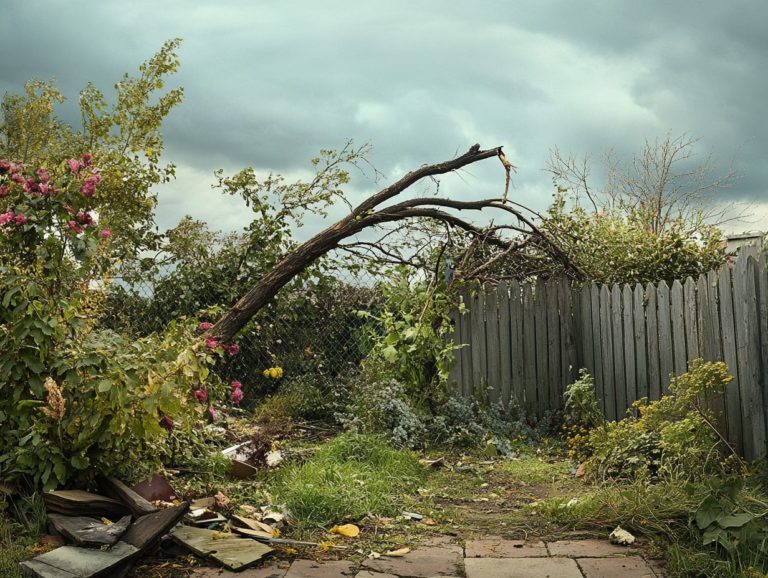5 Things Home Insurance Won’t Cover
Home insurance can be a true lifesaver when disaster strikes, but it s essential to grasp its limitations. As a homeowner, you might be surprised to discover that certain events and items are frequently excluded from your policy.
This article delves into five key exclusions, ranging from natural disasters to high-value items. It also highlights strategies to supplement your coverage and protect yourself against these exclusions.
By understanding these factors, you can make informed decisions and safeguard your home more effectively.
Contents
- Key Takeaways:
- 1. Natural Disasters
- 2. Maintenance and Wear and Tear
- 3. Home Business Activities
- 4. Certain High-Value Items
- 5. Acts of War or Terrorism
- What Coverage Can You Expect from Standard Home Insurance?
- What Are the Different Types of Home Insurance Policies?
- What Are the Factors That Affect Home Insurance Coverage?
- How Can Homeowners Supplement Their Home Insurance Coverage?
- What Are the Most Commonly Excluded Items from Home Insurance Coverage?
- How Can Homeowners Protect Themselves from These Exclusions?
- Frequently Asked Questions
- What are the top 5 things that home insurance won’t cover?
- Will home insurance cover damages from a flood or earthquake?
- Are mold and mildew covered by home insurance?
- Does home insurance cover damages caused by pests or wildlife?
- Are valuable items like jewelry and artwork covered by home insurance?
- Will home insurance cover damages caused by a home-based business?
Key Takeaways:
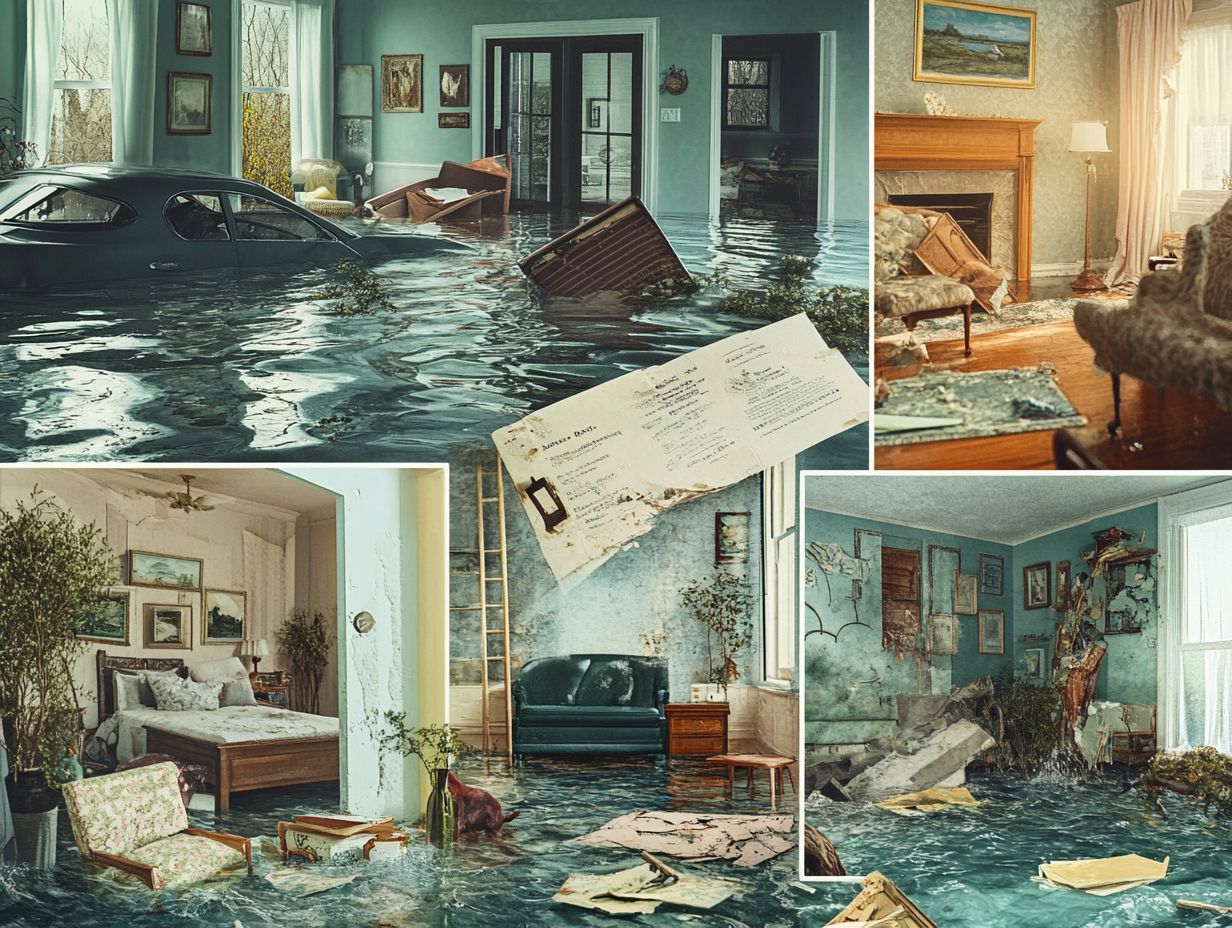
Natural disasters aren’t covered in standard home policies. Consider extra coverage for floods or earthquakes.
Home insurance doesn t cover routine wear and tear. Regular maintenance is key to avoiding expensive repairs.
Running a business from home? Your home insurance might not cover it. Look into separate business insurance.
1. Natural Disasters
Natural disasters present significant challenges for homeowners. It is essential to invest in strong home insurance policies that go beyond standard coverage.
These policies should include specialized protections like flood and earthquake insurance, especially if you live in high-risk areas.
Comprehensive coverage is your safety net, allowing you to recover effectively from instances such as hurricanes, fires, and vandalism. It safeguards your financial investment in personal property and provides peace of mind amid the unpredictability of nature.
From devastating floods that can engulf homes within hours to earthquakes that shake the very foundation of your dwelling, each disaster leaves its mark in distinct ways. If you reside in high-risk zones, consider tailored insurance options that specifically address these threats.
Understanding what your policies cover is crucial; it enables you to navigate the complexities of claims and repairs with confidence.
Incorporating flood and earthquake insurance into your plans streamlines the repair process and creates a financial safety net that helps mitigate the long-term effects of these unexpected calamities.
2. Maintenance and Wear and Tear
Don t wait until it’s too late! Regular maintenance can save you from costly repairs.
Homeowners insurance typically doesn’t cover routine maintenance and wear and tear. To protect your unique property, it’s important to understand the 5 types of home insurance available, as being proactive can help you avoid hefty repair bills down the line.
It s essential to grasp the limitations of your insurance policy regarding these issues to protect the integrity of your property. Common challenges like leaky roofs, aging plumbing systems, and malfunctioning appliances can escalate quickly if you don t stay on top of them.
Overlooking these concerns can erode your property s overall value and put you at risk of significant financial loss. If repairs are a result of neglect, your claims may be denied, underscoring the importance of diligent upkeep.
Regular inspections and timely interventions not only ensure a safe living environment but also maintain your property s market appeal, giving you peace of mind for the long haul.
3. Home Business Activities
Running a home business can complicate your homeowners insurance in unexpected ways. Personal property and liability protection may not fully cover your commercial activities, leaving you vulnerable when it’s time to file a claim.
It’s essential to understand how your business activities interact with your mortgage lender’s requirements and your insurance policy. Unlike standard residential insurance, which primarily shields your personal belongings and limits liability in everyday situations, home business operations introduce a different level of risk and unique insurance needs.
You might find that your existing policy doesn’t extend to business-related liabilities think customer injuries on your property or damage to your inventory. To protect yourself against these gaps, opting for additional policies or endorsements becomes crucial.
Consider looking into business liability insurance or specific endorsements that cover personal property used for commercial purposes. This way, you can ensure comprehensive protection that aligns seamlessly with both your personal and business operations.
4. Certain High-Value Items
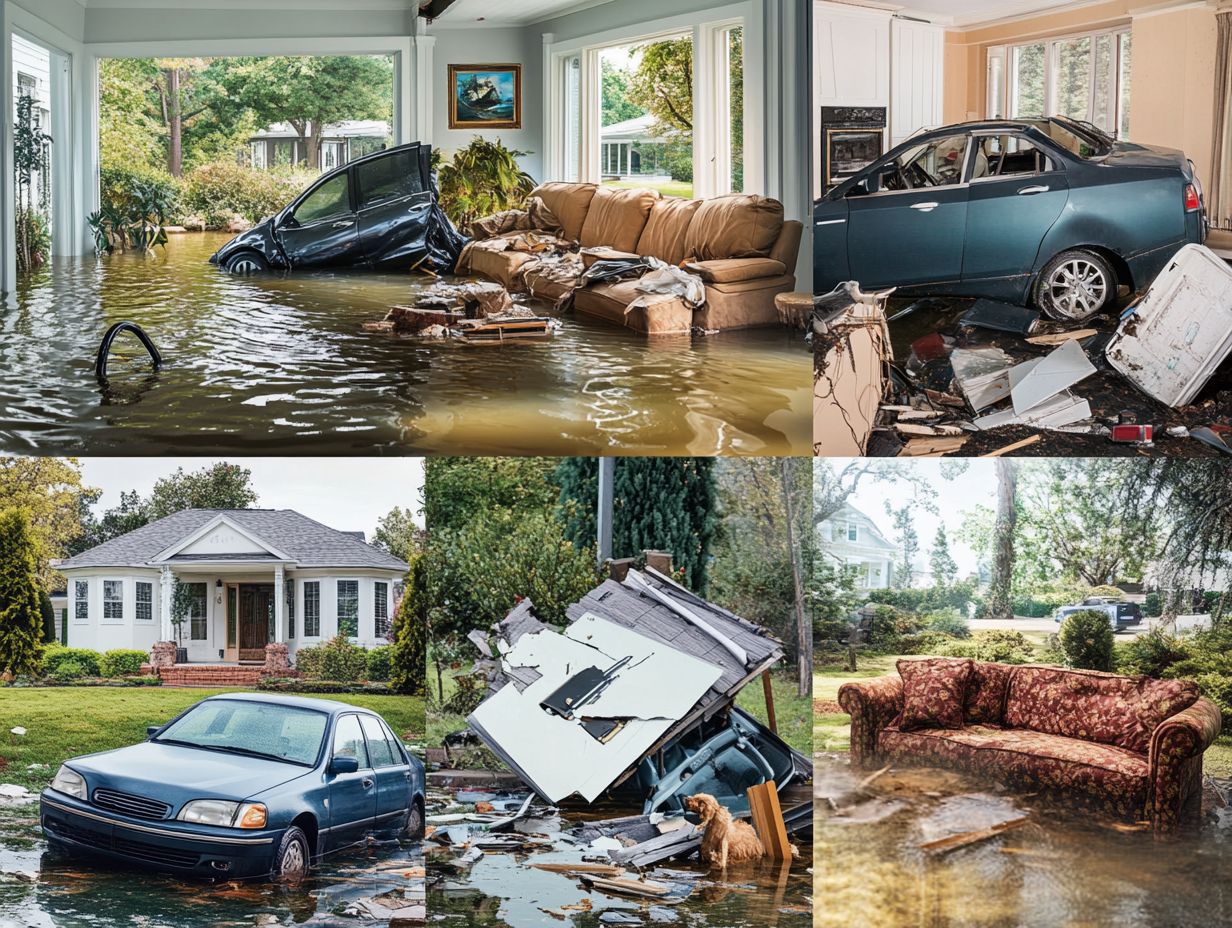
You need to know that homeowners insurance often comes with limitations regarding high-value items like jewelry, artwork, and electronics. Understanding replacement costs and policy exclusions related to these treasured possessions is crucial.
Specialized endorsements or separate policies may be necessary to ensure your prized items receive adequate coverage. In a world where personal belongings carry both significant monetary and sentimental value, maintaining an accurate inventory of these items is increasingly important.
By doing so, you can reduce the chances of not having enough coverage, as many homeowners are unaware that standard policies may only cover a small fraction of their items’ true worth. Regular appraisals and meticulous documentation not only aid in substantiating claims but also enhance your coverage effectively.
This proactive approach protects against theft and damage, giving you peace of mind, knowing that your investments are well safeguarded.
5. Acts of War or Terrorism
Homeowners insurance policies often have a glaring gap: they typically exclude coverage for damages caused by acts of war or terrorism. This means you could find yourself without financial protection in these serious situations. Understanding these exclusions is crucial to evaluate your risk exposure and make sure you have the right coverage now!
In the unfortunate event of a catastrophic incident, such as a terrorist attack or significant conflict, the financial fallout can be devastating. You might face substantial losses that far exceed what standard insurance can cover.
Recognize that without proper coverage, you could be left with hefty out-of-pocket expenses for repairs or related liabilities, putting your assets at significant risk. Now is the time to evaluate your risk management strategies!
Consider specialized terrorism insurance as a safety net against unforeseen events. By assessing your individual circumstances and potential vulnerabilities, you can make informed decisions that bolster your protection against these emerging threats.
What Coverage Can You Expect from Standard Home Insurance?
A standard homeowners insurance policy typically offers a robust array of protections, covering damage repairs from events like fire, vandalism, and theft, as well as liability coverage (protection against claims related to injuries caused by your property) for personal injuries and damage to others’ property.
At the heart of this policy are essential components: dwelling coverage, which protects the structure of your home, and other structures coverage that extends to detached garages, sheds, and fences. Personal property coverage safeguards your belongings inside the home, ensuring that your valuable items are protected against loss or damage.
Liability coverage is equally crucial, shielding you from legal claims arising from injuries to others or damage caused by your property. Each category typically comes with predetermined limits that you should carefully review.
This way, you can make informed decisions about the protection levels that best align with your unique lifestyle and needs.
What Are the Different Types of Home Insurance Policies?
You have a range of homeowners insurance policies at your fingertips, from basic options to specialized coverage like flood and earthquake insurance. Understanding these distinctions is essential for choosing the right policy for your property.
The HO-1 is a straightforward policy that covers specific perils, while the HO-2 expands coverage to include named risks such as fire and theft. If you re looking for something more comprehensive, the HO-3 policy may be just what you need, offering extensive protection for your dwelling and personal belongings, albeit with some exclusions.
If you reside in a high-risk area, the HO-5 policy shines with its robust coverage features, even extending to personal property. There are specialized options too, like HO-4 for renters and HO-6 for condo owners, tailored to fit specific living situations.
Considering the geographical variances in risk, selecting the right type of policy ensures that you have adequate protection and aligns with your individual circumstances and potential threats unique to your location. Take a few moments to assess your current policy today!
What Are the Factors That Affect Home Insurance Coverage?
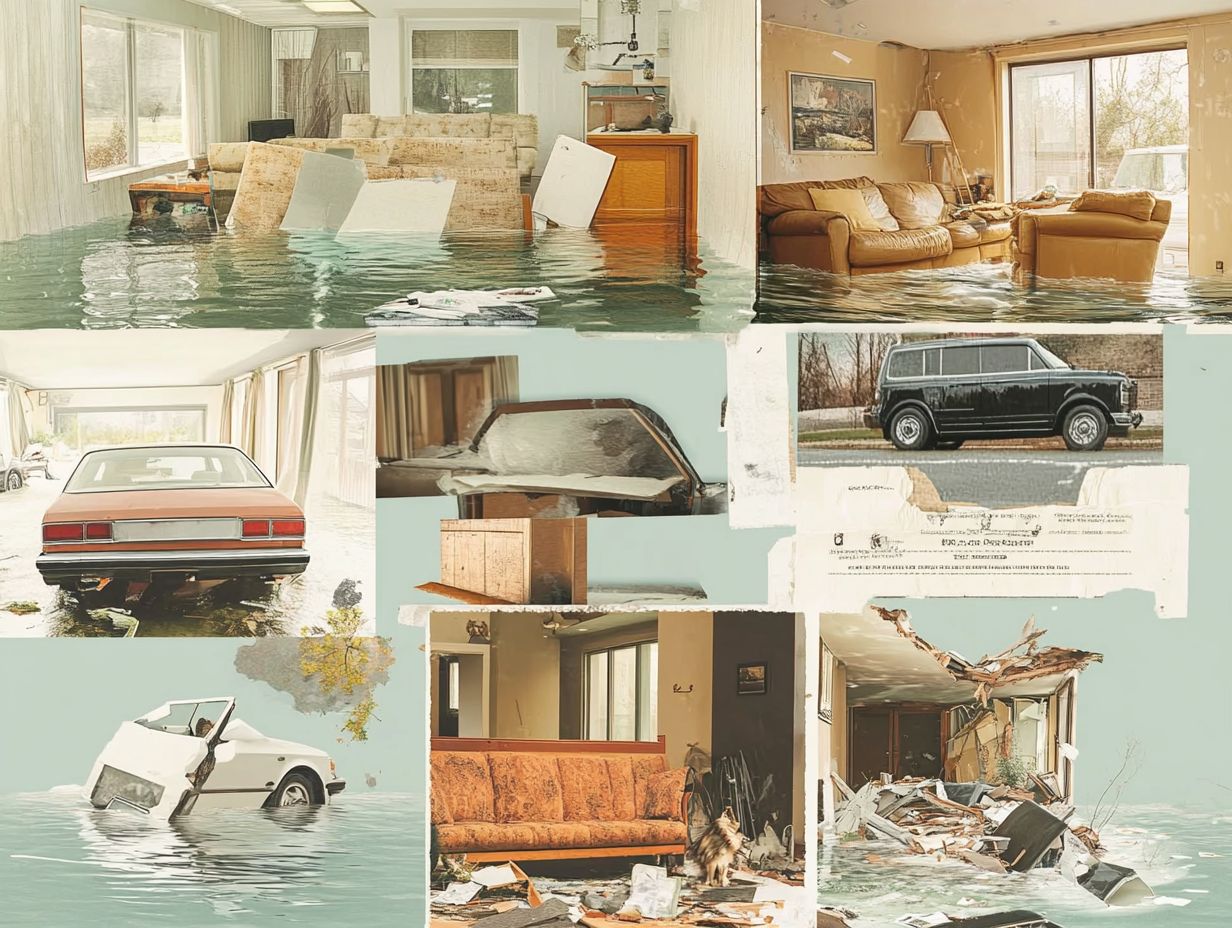
Numerous factors influence your homeowners insurance coverage, including the location of your home, its value, security systems, and the underwriting criteria of various insurance companies. Together, these elements dictate the level of financial protection you receive.
Knowing these factors helps you choose the right coverage. For instance, if your home is in an area prone to natural disasters like floods or earthquakes, you may face higher premiums due to the increased risk.
Modern features, such as a new roofing system or upgraded plumbing, can enhance your property s safety profile and potentially lead to lower bills.
Investing in robust security systems, like alarm systems or surveillance cameras, offers peace of mind and may qualify you for discounts from insurers. This motivates you to adopt measures that reduce risk.
The interplay of these elements is crucial in shaping both the cost and scope of coverage available to you.
How Can Homeowners Supplement Their Home Insurance Coverage?
You can enhance your insurance coverage in several ways. Consider adding riders for valuable items, boosting your liability protection, or opting for specialized policies covering risks not addressed by standard homeowners insurance.
This supplemental coverage provides greater peace of mind and financial stability if you ever need to file a claim.
Identify gaps in your coverage. You might not be protected against natural disasters, theft, or unexpected accidents. By pinpointing these shortcomings, you can take proactive steps, such as adding endorsements to your policies or obtaining separate insurance tailored to your needs.
For instance, investing in replacement cost coverage for high-value items ensures that if loss or damage occurs, you ll receive compensation reflecting the current market value of your possessions. By making this adjustment, you not only safeguard your beloved items but also supercharge your home s security and financial strength!
What Are the Most Commonly Excluded Items from Home Insurance Coverage?
Understanding the most commonly excluded items from your homeowners insurance coverage is crucial. This knowledge helps you avoid unexpected financial burdens during damage repairs, especially for valuable items and personal property that might slip through standard policies.
Flood damage and earthquake-related incidents often fall outside standard homeowners insurance, leaving you and your property at risk.
High-value items like jewelry, art, or collectibles might require special attention. Explore riders or separate policies that specifically address these exclusions.
This helps you create a solid protection plan, keeping your investments safe from unexpected costs.
How Can Homeowners Protect Themselves from These Exclusions?
You can take proactive steps to shield yourself from policy exclusions. Obtain supplemental coverage, implement security systems, and regularly review your homeowners insurance policy to adapt to your evolving needs and risks.
Staying informed about your coverage details and potential exclusions is essential for safeguarding your assets and ensuring peace of mind.
Schedule an annual review with your insurance agent. They can provide valuable insights into any changes in your policy s terms and help identify gaps in your coverage.
Taking inventory of your valuable possessions is also smart. Adding high-value items may require adjustments to your existing policy. By remaining vigilant and engaging in regular communication with your insurance provider, you can feel confident that you are well-protected against the unexpected.
Frequently Asked Questions
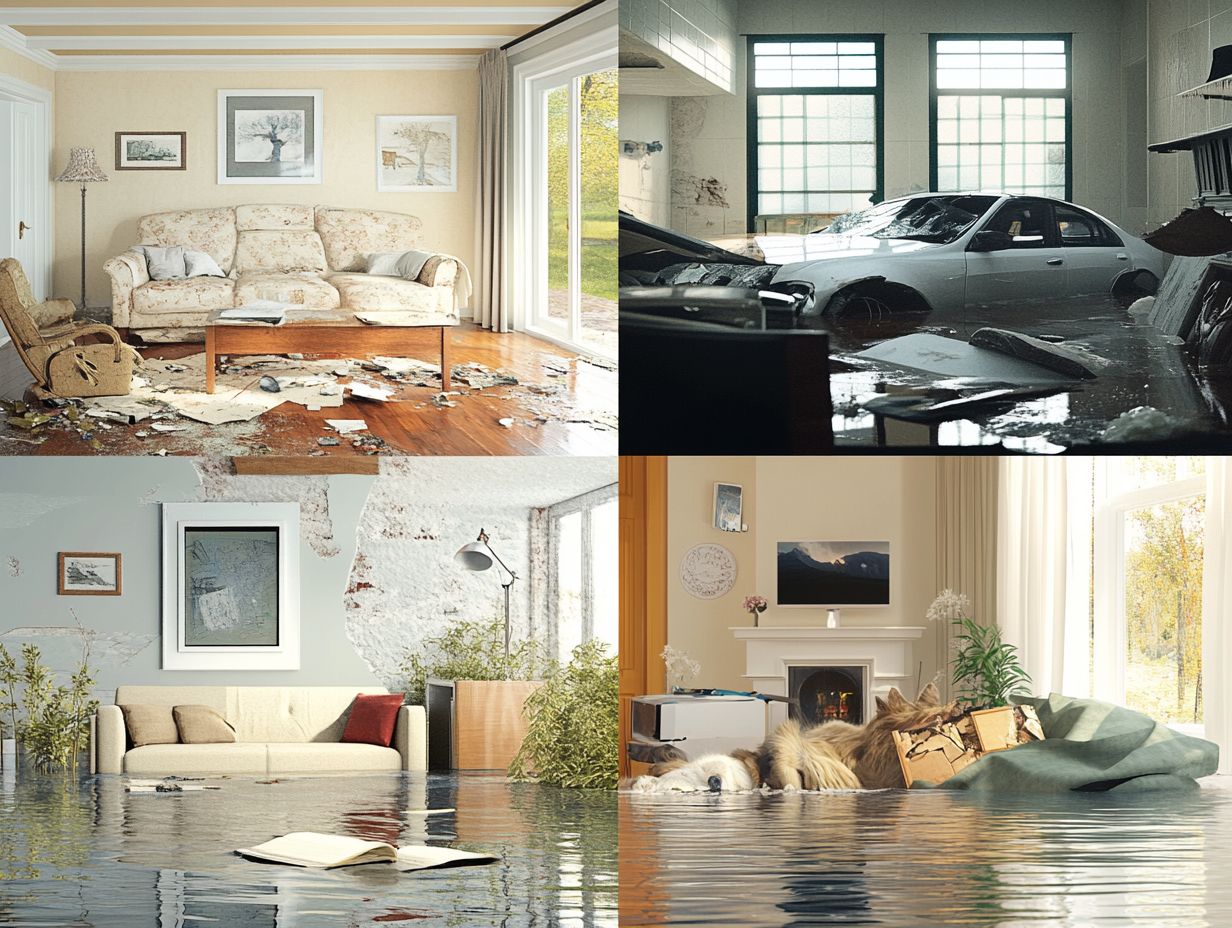
What are the top 5 things that home insurance won’t cover?
Home insurance won’t protect you from all potential risks. Here are the top five exclusions: natural disasters like earthquakes and floods, intentional damages caused by you, normal wear and tear, pests and wildlife infestations, and equipment for home-based businesses. To learn more about what to consider, check out 5 things you didn’t know about home insurance.
Will home insurance cover damages from a flood or earthquake?
No, home insurance does not cover damages from floods or earthquakes. You need separate insurance for these disasters.
Are mold and mildew covered by home insurance?
It depends on the cause. If mold or mildew comes from a covered risk, like a burst pipe, it may be covered. However, if it results from neglect, it s likely not covered.
Does home insurance cover damages caused by pests or wildlife?
No, home insurance does not cover damages from pests or wildlife. These damages usually happen because of poor maintenance.
Are valuable items like jewelry and artwork covered by home insurance?
Yes, home insurance usually covers valuable items like jewelry and artwork, but only up to a certain limit. If your items exceed that limit, consider additional coverage.
Will home insurance cover damages caused by a home-based business?
No, home insurance does not cover damages from a home-based business. If you run a business from home, make sure to get separate business insurance to protect your assets. Don t wait ensure your business is covered today!

